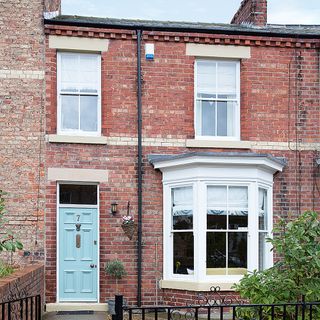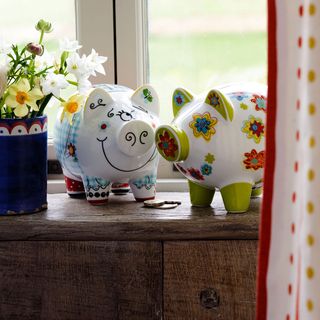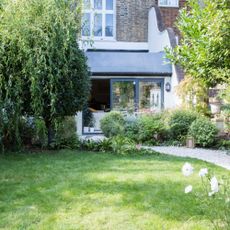Martin Roberts reveals his top tips on how to buy a house at auction
The Homes Under the Hammer star gives us his expert advice on how to get a saleroom bargain

How many times have you watched Homes Under The Hammer and thought, 'I'd love to have a go at that'? We know we have. But have you been put off by the idea of going toe to toe with an expert property developer at auction? Or ending up with a property with damp/subsidence/fire damage – the fate of many a poor soul that's appeared on the show.
If so, we hear you. Which is why we've enlisted the help of the main man, Martin Roberts. 'Buying a property at auction is an exciting and rewarding way of securing your home,' Martin tells us. 'Not least because, once the gavel falls, you know that the property is yours. No gazumping. No to-ing and fro-ing between you and the vendor. No long, protracted sales process. As buying property goes, it’s one of the quickest and easiest routes.'
More great advice: Kitchen extensions – how to design, plan and cost your dream space
'Of course, the auction rooms are also great places to find property bargains but because you’re legally committed to buy once you’ve placed the winning bid, you do need to know what you’re getting in to.' With that in mind, here's Martin's ultimate guide on how to buy a house at auction.

1. Before you start house hunting, go to an auction as an observer
An auction room can seem quite daunting to a complete newbie. You'll hear lots of unusual jargon and you may be surprised at how quickly the auctioneer works through lots. So if you are new to the process, attend a few beforehand and watch. Whatever you do, DON'T BID! Auction companies may differ in the way they run their auctions, so get a feel for what to expect as a bit of a dress rehearsal and then when you actually go along to bid it will seem all the more familiar.
2. Get your finances in order
If you are relying on the sale of another property in order to buy, don't bid on a property before you've sold yours – in other words, before the completion has happened. 'The positive viewing that you had last week is a long way short of a certain sale,' Martin advises. 'Until then, there’s any number of things which could cause the sale to "fall out of bed". You therefore shouldn’t assume any property is actually sold until you have fully completed.'
If you’ve set your heart on an auction property, it’s a risky game bidding on it before you’re absolutely sure you’ll have the proceeds from the other property firmly in your hands. Bidding on and winning an auction lot could result in you having to complete the auction purchase without the proceeds of your sale. You can’t back out and the most likely result will be you requiring Bridging Finance until your first property is sold and monies are transferred to you. Bridging Finance can be costly, so sit on your hands if you don’t want to be in this situation.
Go for it! 5 important reasons why buying a house makes more financial sense than renting
3. Organise a survey

Always make sure that you get a full survey carried out before you decide to go to the auction and bid. This is especially on older properties or those that are clearly in need of some renovation. If that's not possible in the time frame, at the very least visit the property with someone who knows what they are doing, and can spot potential problems. This way you’ll know what issues the property might have and can factor this into your calculations for renovation costs.
'One of the most common mistakes I come across is people under-estimating the amount of work that’s needed and the associated repair costs,' says Martin.
4. Ask for a legal pack
Read the legal pack in advance if there is one and discuss the contents of this with your solicitor. Make sure your solicitor has checked the Title Deeds and any special conditions of sale. While Legal Packs may be available at the auction, don’t leave it until then to familiarise yourself with its contents.
5. Set a price limit

'Always set yourself a maximum price limit on the property and STICK TO IT,' says Martin. 'In the excitement of the auction room, it’s very easy to get carried away, so it’s important that you discipline yourself to only bid up to your maximum.'
To calculate your maximum, work backwards from the end value, having factored in renovation costs, finance and legal costs and of course, a payment for your time.
Martin Roberts will be hosting a one-off DIY special from 12-2pm on Monday 2nd April 2018, BBC Radio 2. You can email Martin beforehand with your DIY dilemmas and disasters at martin.roberts@bbc.co.uk
Hopefully, Martin's given you the confidence to take the plunge. We'd love to hear how you get on at auction!
Get the Ideal Home Newsletter
Sign up to our newsletter for style and decor inspiration, house makeovers, project advice and more.

Amy Cutmore is an experienced interiors editor and writer, who has worked on titles including Ideal Home, Homes & Gardens, LivingEtc, Real Homes, GardeningEtc, Top Ten Reviews and Country Life. And she's a winner of the PPA's Digital Content Leader of the Year. A homes journalist for two decades, she has a strong background in technology and appliances, and has a small portfolio of rental properties, so can offer advice to renters and rentees, alike.
-
 How often should you mow your lawn? A month-by-month guide to cutting your grass, according to experts
How often should you mow your lawn? A month-by-month guide to cutting your grass, according to expertsAre you cutting your grass enough?
By Lauren Bradbury
-
 How to grow mint from seed – expert tips for super easy (and tasty) herbs on tap
How to grow mint from seed – expert tips for super easy (and tasty) herbs on tapAmateur gardeners, assemble! Here's how to grow mint from seed like a pro...
By Kayleigh Dray
-
 How to care for a lawn in shade – expert tips for lush green grass in a shady garden
How to care for a lawn in shade – expert tips for lush green grass in a shady gardenShady garden? No problem! You can still have the lawn of your dreams with just a few tweaks...
By Kayleigh Dray